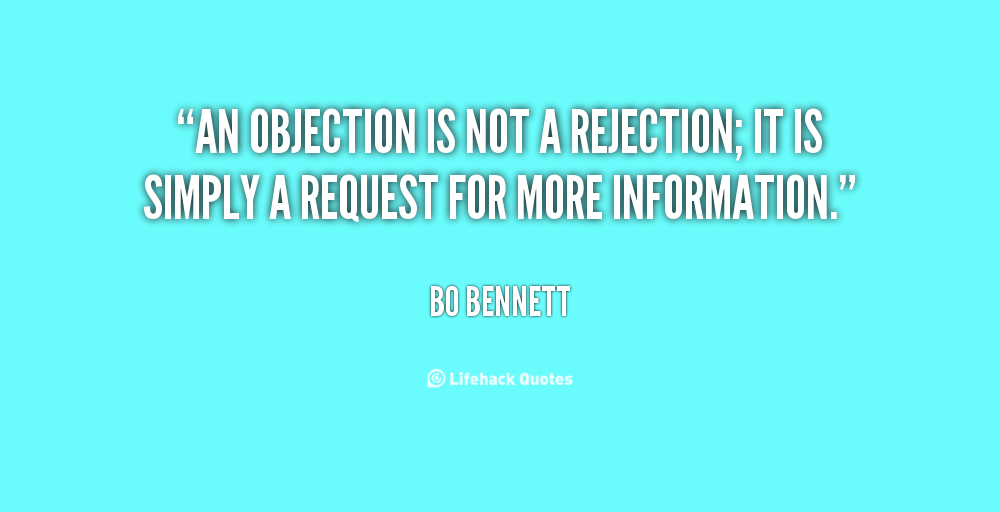Do you know that those in modern sales who handle sales objections successfully have 64% higher deal win rates?
Astonishing as it may sound, customer objections are one of the most dreadful sales situations for 99% of sales professionals. When the customer objects, the salesperson generally feels deep fear of losing the sale, becomes defensive, reacts, and ends up annoying the prospect.
Usually, a seasoned sales executive researches his prospects, reaches them in a manner that suits their personality, completes discovery calls, sets up a demonstration or presentation, and handles negotiation before he moves forward to close the sale.
While the salesperson is moving in his sales cycle, buyers have their own concerns and constraints. This inevitably makes them come out with their objections. Some concerns may be a surface level and some of them may be the real deep issues that they may be thinking about.
As a wise salesperson, you must focus your energies on anticipating and managing these sales objections that will make or break your deals.
So let us explore 6 categories of objections, where most of the concerns for your prospects come from.
Let us dive into each of them and understand tactics to overcome them efficiently.
Sales Objections related to “Need”

How are they expressed?
Not interested as of now…
Don’t need it at this time…
We are happy with what we have…
Don’t know how your product can help us…
Why do prospects say that they are not interested?
Imagine yourself in the customer’s shoes for a second. Why would you say no to a product or service? Somewhere it did not connect with what you were looking for. It was not fulfilling your key emotional or practical needs. You did not “feel” that the product is as impactful as it needs to be, in order to bring the change you want to see.
This means the salesperson,
- Did not understand your needs properly. Or
- Did not propose his product as a solution to your problem. Or
- Did not create enough awareness about the negative impact you may have if you didn’t overcome your problems or frustrations.
How to overcome the “Need” related objections?
As a salesperson, you need to handle your prospecting and discovery stage in selling carefully.
You need to dig deep enough to know the “real pains and frustrations”. Usually, salespeople are impatient to showcase their products and make a sale.
You need to go a step further in making your prospect understand the implications of their current painful situation if they don’t change what is causing frustration.
You need to tactfully present your product as the best solution for your prospect’s situation.
If done well, you will see this kind of objection almost gone in your sales.
Sales Objections related to “Money”

How are they expressed?
Your price is too high…
It is beyond our budget…
We can use that money for something more important or useful …
We can buy if you can give us a good discount…
Why do prospects say that they don’t have the money?
This is the most usual objection that every salesperson in almost any industry faces. If you give in to such objection, the buyer will take total control of the pricing. It will dramatically reduce your profit margins.
So let us introspect again. Last time when you asked for a discount or said you didn’t have money, what did you really feel? You mostly felt that the product the seller is trying to sell was not giving you a strong ROI (Return on Investment). You felt that you will be paying more than what you get in return.
It is a way buyers feel that may be a better deal will be with a lesser price is on the table.
How to overcome the “Price” related objections?
There are several things to consider while handling these objections.
1. While selling, focus on mentioning the ROI of your product for your customer in a way that the customer can relate.
2. Know that such objections are not deal killers. They will not generally break the deal. This will remove your insecurity and keep you calm.
3. As questions like
– “Is something making you hesitant to invest in XYZ?” or
– “Are you really right on your expenses?”
– “Are you just looking for a discount?”
– “Why are you feeling this?”
Understand the real reasons behind their objection.
4. Finally always think about a creative way of pricing your solution, especially if these kinds of objections are the most dominant objections that you or your company faces.
5. Always be ready for this specific type of objection. Most salespeople regularly face price-related objections. Being ready means, you will be well prepared in advance to handle this objection like a pro.
Sales Objections related to “Time”

How are they expressed?
Busy right now. Cannot talk.
Not a good time. Can you call back?
We are not focusing on it as of now…
Not sure as of now. I need some time to think on this…
Why do prospects say they need more time?
Imagine how your usual day or month is. There are at least 8 to 10 things running on your mind. Prioritizing what to focus on, is a stressful challenge. This is why you are constantly switching your focus, trying to calm yourself.
Your prospects are no different. They are constantly juggling their priorities in their personal and professional lives.
To add to this wrestling, with each problem they have plenty of solutions available in the market.
How to overcome the “Time” related objections?
1. First and foremost, always strive to make your solution their priority. Focus on how it will dramatically relieve their pain or add to their pleasure.
2. Use the prospecting stage well to understand their real priorities. If done well, you will know upfront if your product or service is going to be a priority.
3. If it is not a priority for the person you are dealing with, find someone else in the same organization who will find it in his top priorities.
4. Use tactics to create urgency in the sales process. All of us avoid spending money on anything unless it becomes urgent. No one wants to lose money quickly.
Sales Objections related to “Trust”

How are they expressed?
I’ve hardly heard about your guys…
I’ve heard that you faced xyz a few months ago…
We had a few troubles dealing with your company…
I have come across some negative reviews about your organization…
Why do prospects their doubts about your company or product?
There can be several reasons. There may be very less information that they could find about you.
You may have recently launched your products or services or your company.
Some of your unsatisfied customers may have vented their anger on the internet.
Sometimes, the prospects may simply be trying to put you in a lesser position, considering future negotiation possibilities.
How do you overcome the “Trust” related objections?
1. Make sure that there is some positive news about your products or company in the media. Use social media platforms, SEO, influencers, and other portals like news channels to create a positive image.
2. Ensure that as a salesperson, the prospect feels comfort and a level of trust because of how you behave with them. A major part of selling is “selling yourself”. Handle rapport building and prospecting phase of the sales cycle carefully.
3. When the customer talks about lack of trust, know that it is not about you. It is about your company or product. This way, you will feel less stressed and will not attempt to defend quickly.
4. Listen to your customers without interrupting them. Let them vent out their genuine concerns. Try to understand where the root of the trust issue is.
5. Explain the steps you can take to ensure that the customer feels more faith. Your recent blog posts, success stories of your customers, case studies, and news in the media can play a huge role in this.
Sales objections related to “Product”

How are they expressed?
Your product is so hard to understand …
This seems very complicated…
I want these specific features…
I will buy it if you can add xyz features…
Why do objections related to product happen?
When a salesperson encounters such statements, there are many possibilities.
The customer genuinely is not able to relate to your service or offering.
The customer is interested in your product but genuinely needs some specific features.
The customer may be simply trying to get a cheaper price or better deal from you.
The customer may have come across some products in the market, where he got the idea about additional features they are asking for.
The customer for some reason is simply trying to buy more time before you can bring him towards closure.
How to overcome the “Product” related objections?
1. Carefully craft your presentations and demonstration. Always focus on relating the specific things your product or service can do for specific pains the customer has.
2. Avoid presenting all the features and benefits. Focus on those 2 or 3 which really matter to the customer. This will avoid you overwhelming the customer.
3. When the customer expresses this objection, try to dig deeper. Ask questions like “ Interesting! Why do you think so?” or “Why do you want this?”. This will lead you to the real concern or expectation.
4. Focus on giving your customers “aha” moments in your presentations quickly and frequently. This means to show or say things which customers would immediately perceive as “this is what I was really looking for!”
5. Know that many times, the feature requests are just nice to have. Carefully check, if they can be deal-breakers. This will help you decide the next step.
Sales Objections related to “Competition”

How are they expressed?
We’re already using a similar product…
How are you different from xyz in the market …
I’m happy with my current solution…
X Y Z are cost much less than you…
Why do your prospects talk about your competition?
For starters, let’s accept that 99.99% of products or services in the market are not unique.
This applies to your offering also.
The spread of the internet has empowered buyers to research multiple solutions in the market even before they reach you. This means, in modern sales, prospects start comparing you with your competitors right from the first communication from you.
Just think of yourself and how you are always looking for the “better” product or service. How many options do you find when you need something?
How to handle the “Competition” related objections?
1. Right from start, always know that you are being compared – both at the personal and company level. This will keep you at ease throughout the modern sales cycle.
2. Always keep a document with a detailed comparison between you and your competition. Small things play big in sales.
3. If the prospect is happy with the current solution, explore the possibility of how your product may be used differently. This means, in the discovery phase of selling, you need to dig deep about how the customer is using his current product and for which specific use cases.
4. Even if being compared to the competition is a negative feeling, focus on shading light on your strengths. Avoid talking about the flaws or shortcomings of your competition. Even if you want to bring it forth, talk about your product and how it handles those scenarios.
If you have reached here while reading this article, congratulations! You are in a much stronger position to detect and handle 99% of the common sales objections that a salesperson faces.
Every time you come across one, just remember this –

